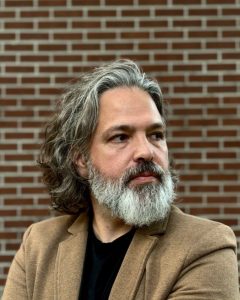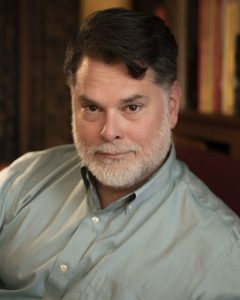WS102: On Walking
Foot Travel as a Magical & Aesthetic Practice
This course concluded in August 2025 and is now self-paced.
Solvitur ambulando (“it is solved in walking”) is one of the great Weird Studies mottos. Some problems can be solved by planning and mapping — getting somewhere high up and surveying the whole landscape at a glance. But some situations call for keeping your feet on the ground and exploring the landscape from the inside: solvitur ambulando. Walking can be a metaphor for doing philosophy at the thin end of the wedge.
But walking isn’t just a metaphor for philosophy. For millennia, walking has been a way of doing philosophy. Aristotle and his followers were known as the Peripatetic school for their habit of philosophizing while strolling around the Lyceum grounds. Nietzsche tells us that we should “put no trust in any idea that was not born in the open air and of free movement,” and Thoreau, Rousseau, Kant, and Heidegger (among others) would have agreed. There is not only a philosophy of walking; there is also a walking of philosophy.
And walking isn’t just about thinking. It is also about sensing, feeling, and imagining. Walking is the handmaid of art. It may even be an art in its own right, an act of co-creation in which the soul and earth conspire to bring forth a world — psychogeography. From the beginning of literature, the walk has been a vehicle for enchantment: some of our oldest stories — “Hansel and Gretel,” “Little Red Riding Hood” — are built around a journey into the unknown. The French Situationists knew this well. For them, the exploratory walk — the dérive, or “drift” — was always a venture into strangeness, even when it threaded through familiar streets. The medieval troubadours spoke of a similar movement, casting the knight’s quest as a form of errancy.
Finally, walking has likely held religious significance for as long as we’ve been upright. In Genesis, to “walk with God,” as Enoch and Noah did, is to live in alignment with the divine. Across cultures, the act of pilgrimage — from the walkabouts of Australian Aboriginal peoples to the Camino de Santiago and the Zen practice of kinhin — stands as a spiritual archetype. To peregrinate is to walk towards a destination while suspending the logic of ends and means. It is to give oneself over to the path — to step, quite literally, into mystery.
A Participatory Experience
More than a disquisition on walking, this course seeks to embody its theme. Having chosen a destination — a deeper understanding of what walking means — J.F. and Phil will proceed without a fixed itinerary, discovering the path through their signature style favoring close reading, exploration, and exchange. Participants are invited to join them in a series of participatory exercises and “event scores” designed to engage thought, feeling, and perception as only walking can. For six weeks, we become the Walking Weird.
Format
The course unfolds over six Lecture Hall sessions, each comprising two 45-minute talks — one by each instructor. A few days after each session, an Office Hours meeting will offer participants the chance to engage directly with J.F. and Phil by asking questions, offering reflections, and sharing “trip reports” drawn from their own experience of the week’s exercise.
Each week brings a new exercise — a prompt or “event score” — inviting participants to explore walking as metaphor, spiritual practice, and embodied inquiry. These exercises lend the course a strong practical dimension, grounding its philosophical and artistic reflections in lived experience.
As with all Weirdosphere offerings, WS102 includes a dedicated feed where instructors and participants can post thoughts, share links, and exchange between lectures.
Schedule
This course concluded in August 2025 and is now self-paced.
Homework
From week to week, Phil and J.F. will assign essays, stories, and works in media in view of upcoming discussions. Whenever possible, these will be made available on the course platform. For copyright reasons, students may need to access certain works on their own.
Why Take This Course?
Students will get to:
- Attend six lectures exploring the weirdness of walking from multiple viewpoints and angles.
- Interact with the hosts of Weird Studies and other participants during the six weekly Office Hours held over Zoom.
- Gain permanent access to recordings of the lectures and discussions.
- Post, share, discuss, and exchange direct messages with the instructors and other students on the Weirdosphere platform.
- Become full-fledged members of a growing learning community and enjoy a discount on future Weirdosphere classes by Phil, J.F., and other thinkers of things strange and astonishing.
Instructor Bio

J.F. Martel is a Canadian author, filmmaker, lecturer, and cultural critic known for his work on the arts, philosophy, and the uncanny. With a background in film production and an interest in metaphysics, Martel explores the intersections of creativity and the ineffable, challenging conventional boundaries of understanding. He is best known for his book Reclaiming Art in the Age of Artifice, which argues for the intrinsic value of art beyond commodification and utilitarianism. Martel’s writings often appear in various publications, where he discusses the spiritual and existential dimensions of culture. As a filmmaker, he has directed several documentaries and short films. Through his work, Martel invites audiences to reconsider their perceptions of reality and embrace the mysteries that lie beneath the surface of the workaday world. He co-hosts the Weird Studies podcast with the music historian Phil Ford.

Phil Ford (Ph.D. University of Minnesota, 2003) is an associate professor of musicology at the Indiana University Jacobs School of Music. He has also taught at Stanford University and the University of Texas at Austin. His work has dealt especially with postwar American culture and music (jazz, pop, film music, the avant-garde), as well as sound, musical performance, philosophies of experience, and the intellectual history of counterculture. He is the author of Dig: Sound and Music in Hip Culture (Oxford University Press, 2013) and has published essays in Representations, Journal of Musicology, Musical Quarterly, and elsewhere. He was the founder and lead writer for the blog Dial ‘M’ for Musicology, which ran from 2006 to 2018, and nowadays co-hosts an arts and philosophy podcast, Weird Studies, with philosopher J. F. Martel. His current work concerns magical and contemplative styles of thought, feeling, and experience in various contexts, musical and otherwise.